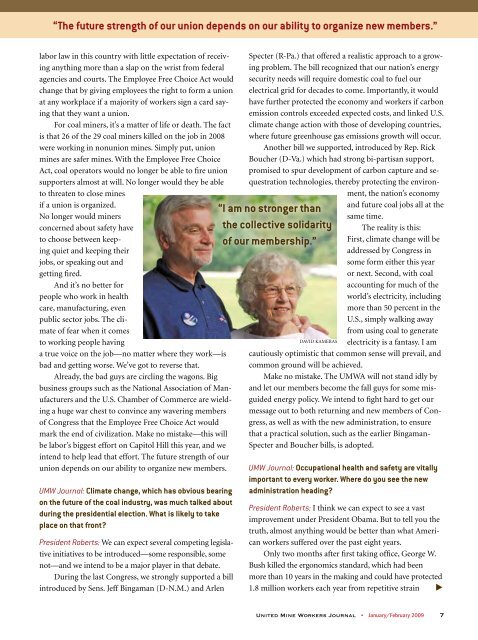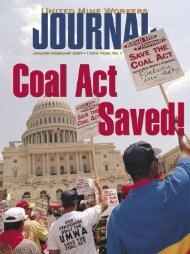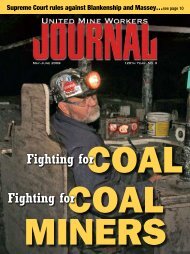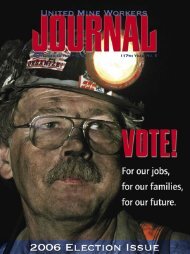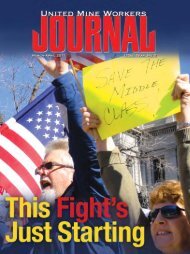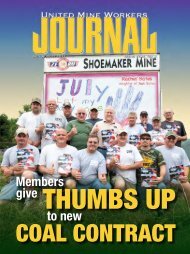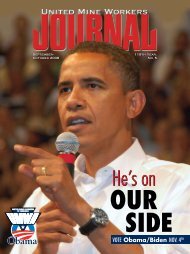January - February - United Mine Workers of America
January - February - United Mine Workers of America
January - February - United Mine Workers of America
Create successful ePaper yourself
Turn your PDF publications into a flip-book with our unique Google optimized e-Paper software.
“The future strength <strong>of</strong> our union depends on our ability to organize new members.”<br />
labor law in this country with little expectation <strong>of</strong> receiving<br />
anything more than a slap on the wrist from federal<br />
agencies and courts. The Employee Free Choice Act would<br />
change that by giving employees the right to form a union<br />
at any workplace if a majority <strong>of</strong> workers sign a card saying<br />
that they want a union.<br />
For coal miners, it’s a matter <strong>of</strong> life or death. The fact<br />
is that 26 <strong>of</strong> the 29 coal miners killed on the job in 2008<br />
were working in nonunion mines. Simply put, union<br />
mines are safer mines. With the Employee Free Choice<br />
Act, coal operators would no longer be able to fire union<br />
supporters almost at will. No longer would they be able<br />
to threaten to close mines<br />
if a union is organized.<br />
No longer would miners<br />
concerned about safety have<br />
to choose between keeping<br />
quiet and keeping their<br />
jobs, or speaking out and<br />
getting fired.<br />
And it’s no better for<br />
people who work in health<br />
care, manufacturing, even<br />
public sector jobs. The climate<br />
<strong>of</strong> fear when it comes<br />
to working people having<br />
a true voice on the job—no matter where they work—is<br />
bad and getting worse. We’ve got to reverse that.<br />
Already, the bad guys are circling the wagons. Big<br />
business groups such as the National Association <strong>of</strong> Manufacturers<br />
and the U.S. Chamber <strong>of</strong> Commerce are wielding<br />
a huge war chest to convince any wavering members<br />
<strong>of</strong> Congress that the Employee Free Choice Act would<br />
mark the end <strong>of</strong> civilization. Make no mistake—this will<br />
be labor’s biggest effort on Capitol Hill this year, and we<br />
intend to help lead that effort. The future strength <strong>of</strong> our<br />
union depends on our ability to organize new members.<br />
UMW Journal: Climate change, which has obvious bearing<br />
on the future <strong>of</strong> the coal industry, was much talked about<br />
during the presidential election. What is likely to take<br />
place on that front?<br />
President Roberts: We can expect several competing legislative<br />
initiatives to be introduced—some responsible, some<br />
not—and we intend to be a major player in that debate.<br />
During the last Congress, we strongly supported a bill<br />
introduced by Sens. Jeff Bingaman (D-N.M.) and Arlen<br />
Specter (R-Pa.) that <strong>of</strong>fered a realistic approach to a growing<br />
problem. The bill recognized that our nation’s energy<br />
security needs will require domestic coal to fuel our<br />
electrical grid for decades to come. Importantly, it would<br />
have further protected the economy and workers if carbon<br />
emission controls exceeded expected costs, and linked U.S.<br />
climate change action with those <strong>of</strong> developing countries,<br />
where future greenhouse gas emissions growth will occur.<br />
Another bill we supported, introduced by Rep. Rick<br />
Boucher (D-Va.) which had strong bi-partisan support,<br />
promised to spur development <strong>of</strong> carbon capture and sequestration<br />
technologies, thereby protecting the environment,<br />
the nation’s economy<br />
“I am no stronger than<br />
the collective solidarity<br />
<strong>of</strong> our membership.”<br />
David Kameras<br />
and future coal jobs all at the<br />
same time.<br />
The reality is this:<br />
First, climate change will be<br />
addressed by Congress in<br />
some form either this year<br />
or next. Second, with coal<br />
accounting for much <strong>of</strong> the<br />
world’s electricity, including<br />
more than 50 percent in the<br />
U.S., simply walking away<br />
from using coal to generate<br />
electricity is a fantasy. I am<br />
cautiously optimistic that common sense will prevail, and<br />
common ground will be achieved.<br />
Make no mistake. The UMWA will not stand idly by<br />
and let our members become the fall guys for some misguided<br />
energy policy. We intend to fight hard to get our<br />
message out to both returning and new members <strong>of</strong> Congress,<br />
as well as with the new administration, to ensure<br />
that a practical solution, such as the earlier Bingaman-<br />
Specter and Boucher bills, is adopted.<br />
UMW Journal: Occupational health and safety are vitally<br />
important to every worker. Where do you see the new<br />
administration heading?<br />
President Roberts: I think we can expect to see a vast<br />
improvement under President Obama. But to tell you the<br />
truth, almost anything would be better than what <strong>America</strong>n<br />
workers suffered over the past eight years.<br />
Only two months after first taking <strong>of</strong>fice, George W.<br />
Bush killed the ergonomics standard, which had been<br />
more than 10 years in the making and could have protected<br />
1.8 million workers each year from repetitive strain <br />
<strong>United</strong> <strong>Mine</strong> <strong>Workers</strong> Journal • <strong>January</strong>/<strong>February</strong> 2009 7


